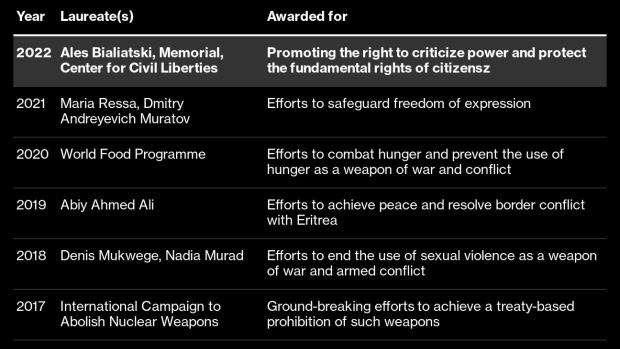Oct 7, 2022
Nobel Peace Prize Jointly Awarded to Belarus Rights Activist, Russian and Ukrainian Groups
, Bloomberg News

(Bloomberg) -- Human rights advocates in the former Soviet neighbors of Belarus, Ukraine and Russia won the Nobel Peace Prize for their efforts to fight authoritarian regimes as Europe’s worst military confrontation since World War II is roiling the region.
Ales Bialiatski from Belarus, Memorial of Russia and Ukraine’s Center for Civil Liberties were awarded the 10-million Swedish kronor ($900,000) prize by the Oslo-based Norwegian Nobel Committee on Friday.
The committee “wishes to honor three outstanding champions of human rights, democracy and peaceful co-existence,” it said in a statement. “This year’s laureates have revitalized and honored Alfred Nobel’s vision of peace and fraternity between nations -- a vision most needed in the world today.”
The announcement was unexpected, with opposition leaders in Belarus and Russia, Sviatlana Tsikhanouskaya and Alexey Navalny -- both vocal critics of Moscow’s invasion of Ukraine -- long tipped as potential winners. Coming on the day Vladimir Putin celebrates his 70th birthday, it awards the prize to a critic of the Russian president’s regime for the second year in a row.
The Center for Civil Liberties in Ukraine has identified and documented Russia’s war crimes against civilians since Putin’s full-scale invasion in February, with its database listing more than 19,000 incidents by now, according to Olexandra Matviychuk, the head of the organization.
“Armies are speaking now, because before the voices of human rights defenders were not heard in our region,” she said on Facebook.
The decision to award the prize to three groups from countries on opposite sides of Russia’s invasion drew some criticism.
“Ukrainians do not want the struggle for human rights in the three countries to be perceived equally,” Anastasia Magazova, a journalist from Ukraine based in Germany, said on Twitter. While the Russian and Belarusian prize winners have “garnered enormous” respect with their work, the three countries shouldn’t be viewed as having a “fraternal friendship,” she said.
Founded by Soviet-era dissidents including Nobel Peace Prize laureate Andrei Sakharov, Memorial was ordered by Russian authorities to shut down earlier this year on the grounds that it failed to identify itself as a “foreign agent.”
The group catalogs political repression ranging from mass purges and the Gulag prison system of former Soviet dictator Josef Stalin to the persecution of dissent in contemporary Russia under Putin.
“This award is a tribute to all of Russian civil society, which is in a terrible situation now,” Memorial co-chairman Oleg Orlov said. “In these depressing circumstances, this award will inspire us to continue our work.”
He spoke by phone from outside a Moscow courtroom, where the group was appealing an order evicting it from its offices.
Bialiatski, 60, is the chairman of Viasna, a non-governmental center in Belarus that has tracked human rights violations since 1996. Bialiatski was detained last year in President Alexander Lukashenko’s ongoing repression of the opposition following nationwide protests against his claimed landslide victory in the 2020 election.
Viasna is effectively outlawed in Belarus, with seven of its members imprisoned, including Bialiatski.
“Government authorities have repeatedly sought to silence Ales Bialiatski,” the committee said. “Since 2020, he is still detained without trial. Despite tremendous personal hardship, Mr Bialiatski has not yielded an inch in his fight for human rights and democracy in Belarus.”
Bialiatski is the second citizen in Belarus’s independent history to receive a Nobel Prize after Svetlana Alexievich won the award in literature seven years ago.
Last year’s winners were journalists Maria Ressa and Dmitry Muratov, with the latter suspending publication of his newspaper in Russia in March after the passage of legislation criminalizing independent reporting on the war. He auctioned his Nobel medal in June for $103.5 million to raise funds for Ukrainian refugees.
(Updates with Ukrainian comment from fifth paragraph)
©2022 Bloomberg L.P.







